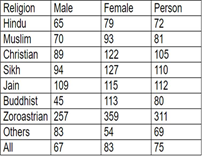

The Ministry of Statistics and Programme Implementation has released the report of a survey titled ‘Health in India’,
Context
The Ministry of Statistics and Programme Implementation has released the report of a survey titled ‘Health in India’, whose main objective was to gather basic quantitative information on India’s health sector.
About
- The report is released by the Ministry of Statistics and Programme Implementation.
- It details aspects of the role played by government and private sector facilities.
- It also contains health information for separate religious communities, including estimates of their susceptibility to ailments.
- The report is based on information collected through NSS Schedule 25.0 (Household Social Consumption: Health) spread over the entire Indian Union.
- Data were collected through a sample survey of 1.13 lakh households covering 5.55 lakh persons.
How ‘healthy’ is India?
- Around 7.5 percent of Indians reported that they were suffering from ailments.
- The difference in people suffering from ailments in rural and urban India was stark.
- rural India- 6.8 per cent
- urban India- 9.1 per cent
Which religious group is the most prone to illness?
- The Zoroastrian community remains the most susceptible to ailments.
- This number for other communities is:
- Jains- 11.2 per cent
- Sikhs- 11 per cent
- Christians- 10.5 per cent
- Muslims- 8.1 per cent
- Buddhists- 8 per cent
- Hindus- 7.2 per cent
|
What is Ailment?
|
Division in terms of sex

- Women remain more susceptible to suffering from ailments than men.
- In rural India 6.1 per cent of males said that they were suffering from ailments, while 7.6 per cent of rural women said the same.
- While 8.2 per cent of urban males said that they were sick, 10 per cent urban females said the same

